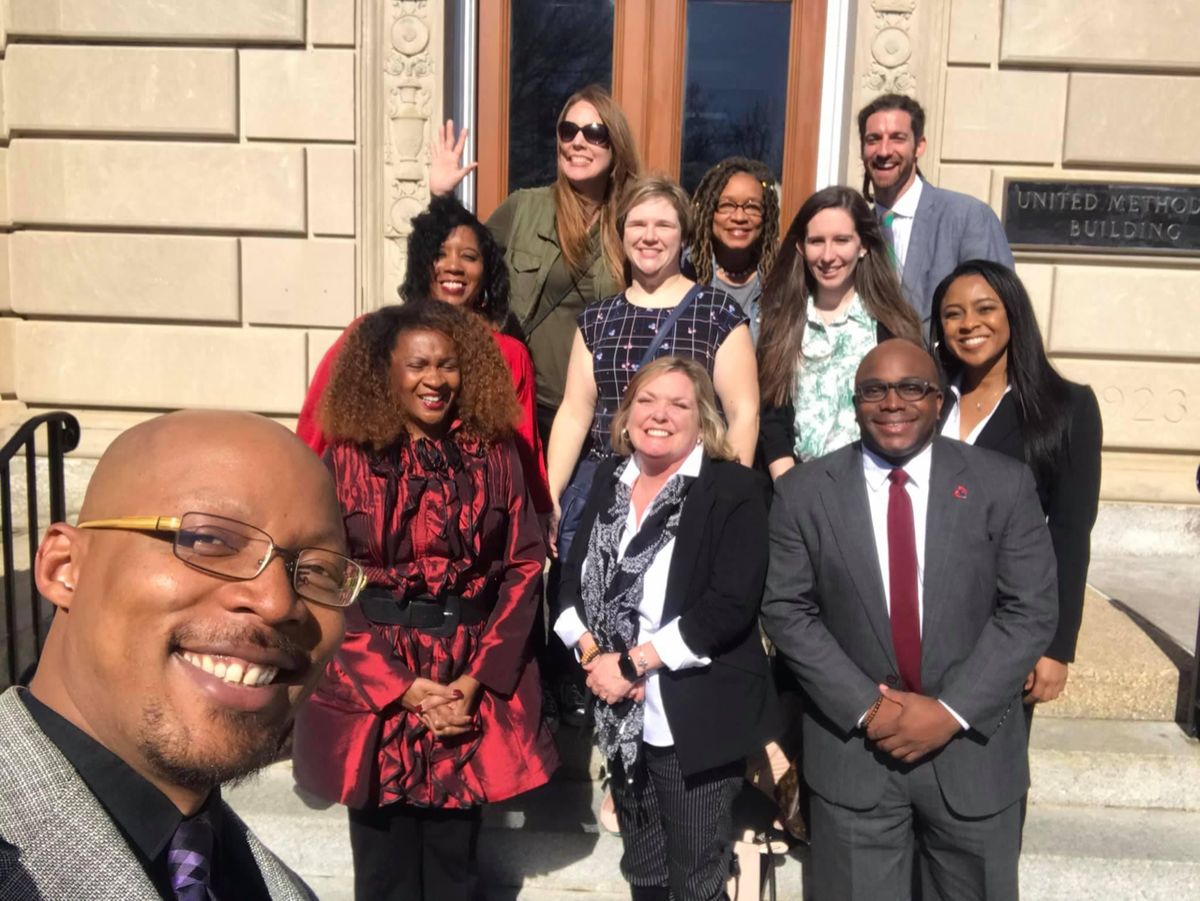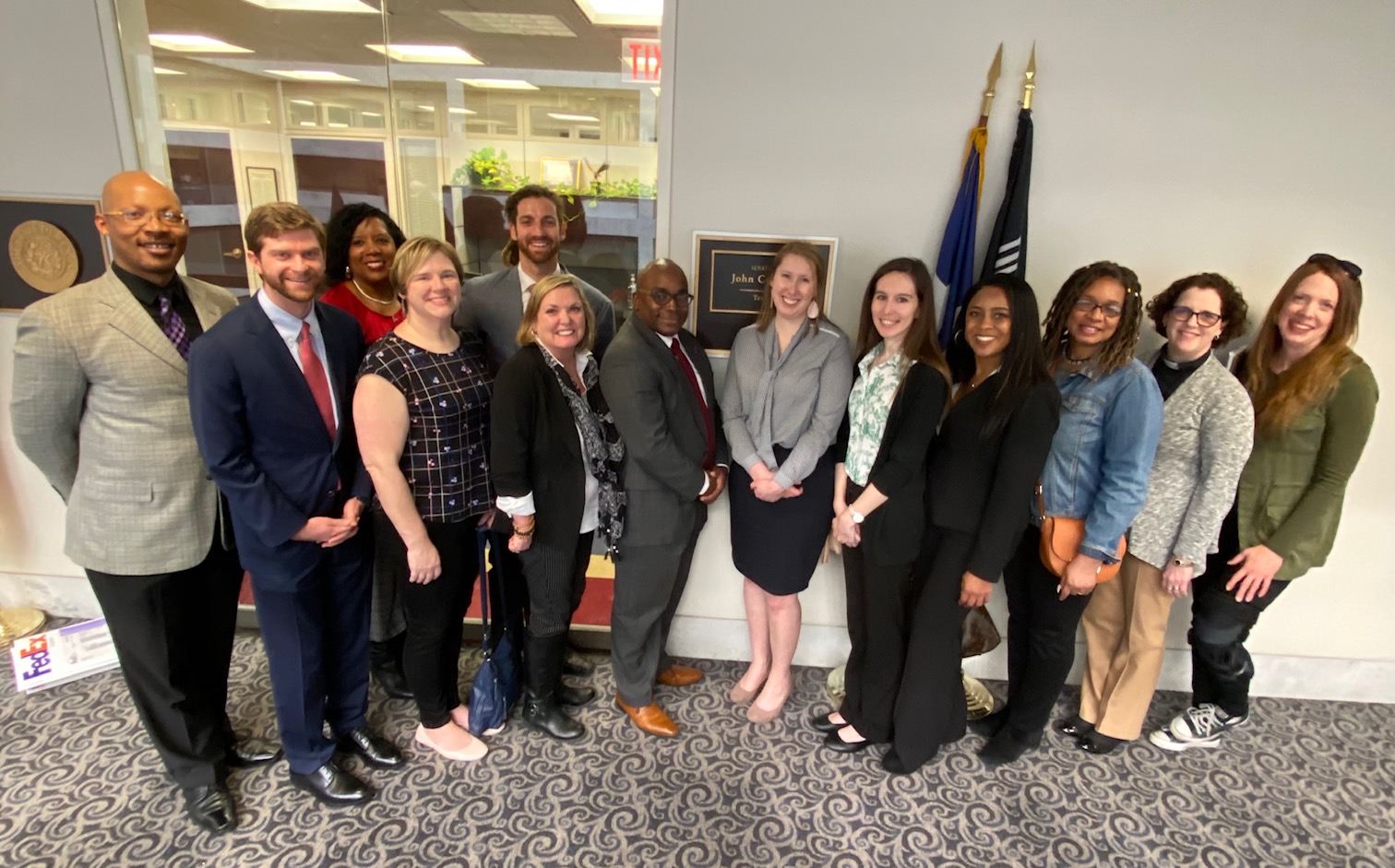"Hallelujah Anyhow": Virtual Advocacy in a Tumultuous Time
Min. Christian Watkins, of the National Council of Churches writes, "While the pandemic has made some things harder, connecting through technology and access to our elected officials has become easier."

In a time when not growing weary in doing good is a daily struggle, it has been especially easy to lose sight of the harvest we are promised in Galatians 6.
The global pandemic alone is enough to cause anyone to go crazy. The anguish and despair of normal life experiences are coupled with the constant barrage of bad news from every part of our country, and the battles between Black lives, all lives and no lives mattering at all. And then, we have the controversially combative legislative landscape of our nation’s capital. I am almost certain I am not the only one who questions their mental health at one point or another during the week. Whew!
Is there any hope??
It can be quite paralyzing, let alone unsettling. When I accepted Church and Society’s opportunity to become the 2019-2020 Wendland Fellow for Faith and Justice from the North Texas Annual Conference, even I could not foresee the chaos we’ve endured this past year. Many losses grieved, much anger and frustration has been felt, the bad days seemingly outweigh the good days. Yet, we’re enduring still, and for me, it’s been partly because of those I see and know are working out their salvation in fearful reverence and trembling humility (Phil. 2:12) through civic engagement.
Covid-19 has indeed made some personal matters harder, yet it has also made advocacy and public witness with our elected officials easier to access and accomplish. Understanding and navigating the legislative processes is a daunting task when there’s a high influx of new policies that betray America’s constitutional equity and just goals, unraveling current statutes and disrupting foreseeable progress. Justice advocates and policy analysts in D.C. and across the country are seemingly working from a disadvantage because of this.
But, experiencing firsthand the intentional community of diverse faith-based advocates built through the Washington Interfaith Staff Community has been refreshing. Furthermore, enlivening and working with United Methodists from the Central Texas and North Texas Annual Conferences in forming the Advocates for Justice cohort to lean further into our Wesleyan heritage of advocacy and abolitionist work on the local, state and federal levels has been life-giving.

As we “carry each other’s burdens” as recorded in Galatians (6:2), we work to “fulfill the law of Christ.” As we faithfully carry the concerns of our community to those in elected and appointed positions, we show those whom we faithfully commiserate with that they are not alone in their struggles and thereby participate in our communal liberation. When, together, we hold each other and our elected officials accountable to upholding the lofty goals of pursuing liberty, justice, equality under the law for all peoples and not just those of the dominant culture and economic brackets, I do believe our country will be a much happier community of diverse peoples, establishing on Earth what is in Heaven. Isn’t that our prayer?
There are positive relationships between spirituality, commitments to social justice advocacy and the willingness to take individual action to combat injustice. William Wilberforce said, “you may choose to look the other way, but you can never say that you did not know.” And, when we know better, we do better, and we feel better as a result. These have been the inspiring revelations experienced by many doing this work collectively, invigorating them to continue the course of social justice activism.
This is soul-work we’re doing. Not just for ourselves, but for the edification and socioeconomic empowerment of those who are relegated to the margins of society through legislation, and consequently for the soul of our nation. Coordinating meetings with congressional members and groups of advocates was a daunting task, pre-Covid. Whether in-district or in Washington, D.C., making an appointment, despite organizing a gathering of working people to meet with their Members for 30-minutes, was challenging.
After the onset of the pandemic, everything went virtual and appointments were easier to coordinate and participate in. While the pandemic has made some things harder, connecting through technology and access to our elected officials has become easier. The connectivity through social media and communications platforms and free flow of information leads to more hands-on-deck to do this work of justice so sorely needed in our country and world.
Through monthly Zoom meetings with Senator Cornyn’s office and other Members, the Advocates for Justice were able to more easily connect with the Senators’ staffs, discuss issues important to upholding our biblical and Social Principles, and press upon them the need to support legislative actions conducive to human flourishing domestic and abroad. The connection of clergy and laity on-the-ground in north Texas to interfaith resources and organizations deep in the D.C. trenches has indeed drawn the circle of those working for the sake of the disenfranchised a little wider and tighter.
And it’s especially emboldening to know we the people called United Methodists have a denominational agency committed to educating United Methodists and advocating on our collective behalf throughout the world according to our collective Christ-centered, God ordained Wesleyan heritage. All things do indeed work together for those who love God and are called according to God’s purposes. Information is shared easier, education on the issues increases, relationships grow deeper and the courage to stand up and speak out grows more resilient when there are a couple good friends standing with you, literally or virtually.
Peacemaking is not passive. Justice is uninterested in fake unity. Love is not silent in the face of wrongdoing. Hope isn’t pretending that things are perfect. Faith is active for the sake of others.
As we may not see the fruits of our actions, we have faith that our persistence and Christian presence impacts the lives and hearts of those in authority. As we keep knocking and keep showing up to the seats of power, our faith tells us that our prayers will be answered and people will be liberated from their legislatively induced struggles. As we keep standing in the gap between the haves and the have-nots, the chain of human interconnectivity will grow stronger and those who refuse to see and feel as such might just eventually see their neighbors–who don’t look, live, love or pray like them–as themselves, and their hearts turn from stone to flesh. There is indeed hope in this sordid world as many heed God’s ordinance of making justice happen, living lovingly merciful and walking humbly with our God who resides in all of Creation. And for that, we have a reason to collectively proclaim “Hallelujah” anyhow.
Now, stay faithful, be informed and active, and #govote.